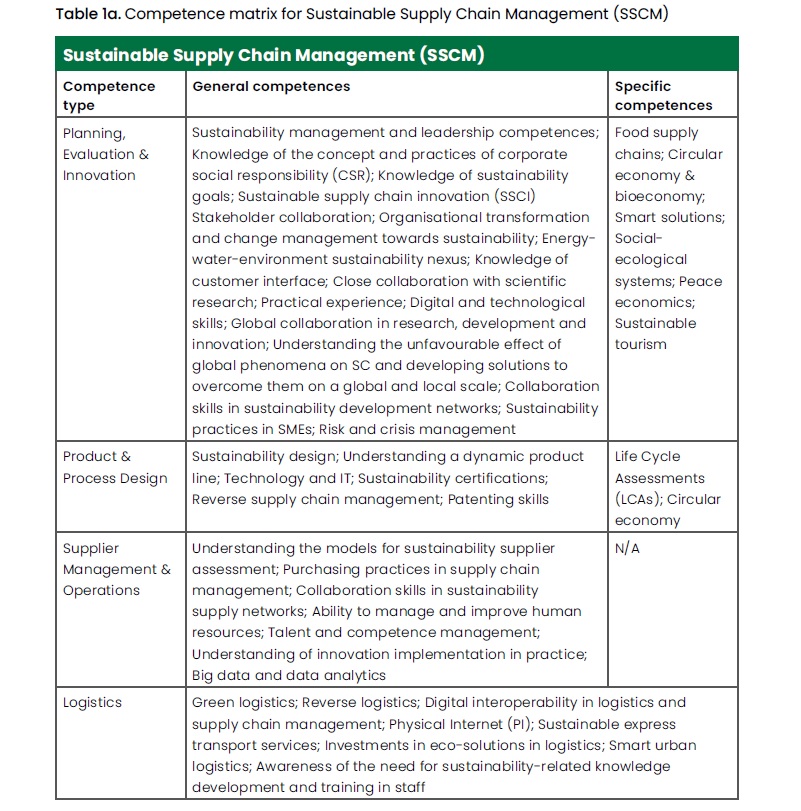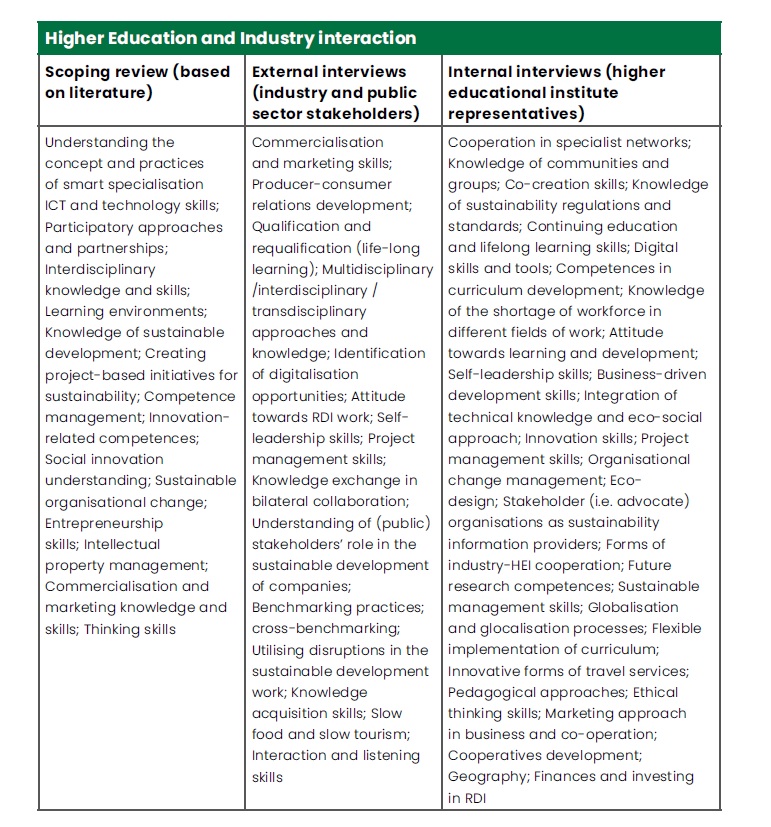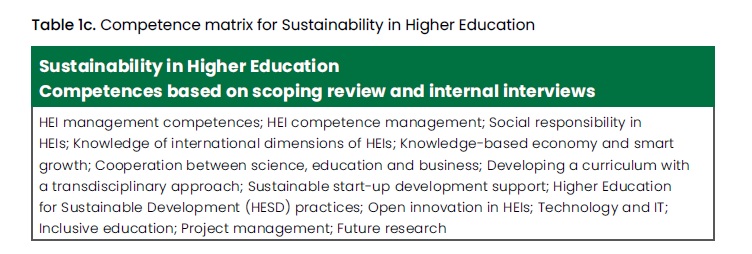Holistic internationalisation and the promotion of sustainable development in all our actions are among the key strategic aims of Karelia University of Applied Sciences. This development work is in turn supported by the three-year Horizon2020-funded project INVEST4EXCELLENCE. The project is elaborated by the INVEST European University, which is an educational and research community of five higher education institutions (HEIs) from Slovakia, Bulgaria, Greece, Finland and the Netherlands, and their regional stakeholders.
The INVEST4EXCELLENCE project aims for capacity building that fosters the competence development and strategic elaboration of the joint research and innovation agenda for the existing INVEST alliance. This paper discusses the development, implementation and key findings of the three-step case study research that frames the staff competence development process.
Introduction
In 2020, Karelia UAS joined the ERASMUS+ European Universities-funded INVEST Alliance. The INVEST consortium is a combination of five HEIs from Finland, Slovakia, Bulgaria, Greece and the Netherlands. The alliance is supported with the three-year Horizon2020-funded INVEST4EXCELLENCE project that started in 2021 and aims at establishing a common research, development and innovation agenda and a competence development ecosystem for the alliance.
To support the development agenda, the alliance conducted a three-step case study to identify the key research, development, and innovation (RDI) competences, which are essential in developing and maintaining sustainable supply chains (SSC). Firstly, the case was framed with scoping review analyses that were based loosely on the scoping review protocol by the Joanna Briggs Institute (JBI, 2022). Secondly, it was defined in more detail with organisational case descriptions and, thirdly, the focus group data was collected from the identified informants. The focus group informants included RDI professionals from most of the INVEST partners and their regional stakeholders from the public and private sectors. The results were summarised in the form of an RDI competence matrix, in which three key areas of competence were identified: 1) sustainable supply chain management (SSCM), 2) HEI-stakeholder interactions, and 3) the internal sustainable development of HEIs.
The results provide a reference point for the HR development that is needed to ensure relevant capabilities in promoting sustainability and responsibility in the research, development and innovation of supply chains within the INVEST consortium. This process serves the goal to create a joint INVEST centre for excellence in the longer term.
Research process and competence matrix description
Karelia UAS leads the capacity-building process and is responsible for the evidence-based approach. The essential RDI competences in maintaining and developing sustainable supply chains (SSC) were reported in the form of a competence matrix. The data collection included a scoping review, an organisational case study and a focus group interview, and the results were grouped into three categories based on the content analysis method.
First, the sustainable supply chain management group (SSCM) included four main categories that are all sub-grouped in more detail into general and specific competences (see Table 1a).

The general competences include a wide variety of skills and knowledge from sustainable leadership to corporate social responsibility (CSR) and from sustainability certifications to technology and IT, big data and green logistics. Specific competences seem to go deeper in understanding a more defined context and include the circular economy, life cycle assessment (LCA) and peace economics, for example. Some competences are overlapping within the four main categories.
Second, based on the scoping review and internal and external interviews, the higher education and industry interaction group includes a wide list of detailed competences that still need thematic grouping and further elaborations (see table 1b).

Both higher education professionals and stakeholder representatives stressed that a varied set of substance skills and knowledge have to be increasingly accompanied by a wide range of interaction skills. An important aspect of these skills is flexible interaction in interdisciplinary specialist networks in a vast variety of contexts. Companies pointed out that their work in diverse contexts benefits from experts with diverse professional backgrounds and cross-cutting competences. One company representative stated that it is difficult for them to find employers who can explore solutions from several points of view, such as water and electricity, simultaneously.
Third, based on the scoping review and the internal and external interviews, the sustainability in higher education group includes quite a comprehensive list of organisation-related competences that support applying sustainability into all actions of higher education (see table 1c).

Examples of the main competences include, for example, Higher Education for Sustainable Development (HESD) practices (see e.g. Lozano et al. 2017), open innovation in HEIs, and knowledge of international dimensions of HEIs. As sustainability challenges are global, sustainable development calls for global interaction and reciprocal co-creation. Thus, the RDI professionals need to be competent in order to contribute to global networks. More specifically, this requires skills in globalisation, languages and intercultural communication.
Discussion
The definitions of all these three groups, sustainable supply chain management, interactions between HEIs and industry, and sustainability in higher education, can bring benefits as a baseline to evaluate existing competences, identifying the gaps and developing specified learning opportunities for capacity-building actions within the INVEST alliance.
Overall, the results indicated that the RDI skills, competences and knowledge related to HEI-stakeholder interaction are an important and diverse aspect of RDI capacity-building actions in sustainable supply chains. The HEI-stakeholder interaction pertains to 1) the competences needed by the RDI professionals to carry out the HEI-stakeholder collaboration, and 2) the competences that the students need when working in the context of sustainable supply chains now and in the future. The study showed that higher education and stakeholder representatives partly share the same vision for these interaction capacities, but there are also differences.
Based on the results, it seems that the focus groups, which included HEI professionals and stakeholders, agree that managing sustainability challenges requires self-oriented continuous learning and business development of RDI personnel. Moreover, the informants highlighted the right attitude towards RDI work and self-oriented life-long learning skills as essential. Thus, the results of this three-step case study validate the need to create a systematic capacity-building process with both informal and formal learning opportunities to re- and upscale the competences to boost more sustainable supply chains.
In addition to fostering interactional activities with stakeholder groups, sustainability efforts in supply chains challenge higher education institutions to identify, manage and develop their internal competences, skills and knowledge. Overall, the research provided insight into the organisational competence development of RDI dimension with respect to management, social responsibility and internationalisation on a broad scale.
In the following project years, the capacity-building process will be further complemented with the creation of a tool for stakeholder involvement, development of open science training materials, and opening up the holistic INVEST Fellow Programme for peer-learning opportunities.
Authors:
Tiina Muhonen, Project Specialist, Karelia University of Applied Sciences
Helena Puhakka-Tarvainen, Senior Project Manager, Karelia University of Applied Sciences
Liisa Timonen, Head of Internationalisation, Karelia University of Applied Sciences
References:
Lozano, Rodrigo, Michelle Y. Merrill, Kaisu Sammalisto, Kim Ceulemans, and Francisco J. Lozano. 2017. “Connecting Competences and Pedagogical Approaches for Sustainable Development in Higher Education: A Literature Review and Framework Proposal” Sustainability 9, no. 10: 1889. https://doi.org/10.3390/su9101889
Joanna Briggs Institute (JBI) 2022. JBI Scoping Review Protocol Template. https://jbi.global/sites/default/files/2020-07/SUMARI_Protocol_Template_Scoping_Reviews.docx. 30.9.2022.
Cover photo: Tirachard Kumtanom
Another article on the same study is in the process of being published:
Timonen, L., Puhakka-Tarvainen H. & Muhonen T. (2022) Relevant Research and Development Competences. Smart Energy for Smart Transport -Proceedings of the 6th Conference on Sustainable Urban Mobility, CSUM2022, August 31- September 2, 2022, Skiathos, Greece.

